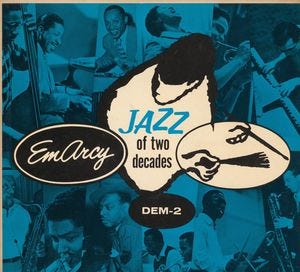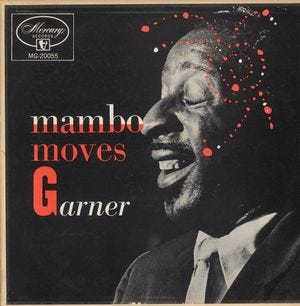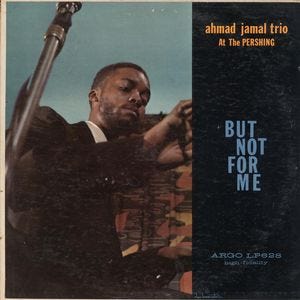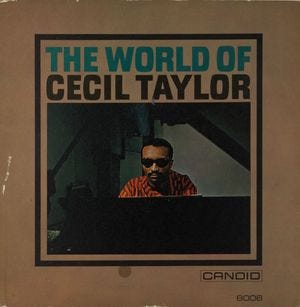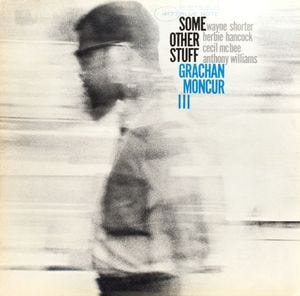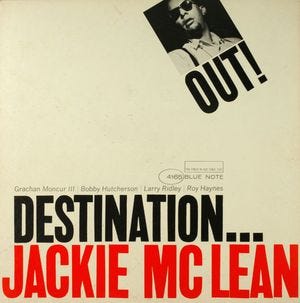Some Jazz Records: Dave Burrell Clippings
Comments on recordings from musicians and other actors of the jazz scene. Random and not-so-random listening cues from the archives.
Jazz of Two Decades, EmArcy DEM-2, 1955, LP.
Dave Burrell’s family moved to Hawaii shortly after World War II, when he was of elementary school age. "At night the adults would get together and play their 78s and later on the LPs," Burrell said in the first volume of William Parker’s Conversations series. "I heard a lot of Basie and Oscar Peterson and Brubeck. And I had one LP that I played over and over, Jazz of the 1940s and 1950s. I only played the 1950s side and I heard Nellie Lutcher and Sarah Vaughan. I was going on twelve maybe, going into teenager. I was playing boogie-woogie and I listened a lot to Lucky Thompson." In all likelihood, Burrell was referring to Jazz of Two Decades, an EmArcy sampler released a couple of years later. As a 98¢ promotional item aimed at interesting buyers in other EmArcy titles, this LP has not entered the jazz pantheon. The included tracks are detailed in Leonard Feather’s liner notes, scanned by the Internet Archive.
Erroll Garner, Mambo Moves Garner, Mercury MG 20055, 1954, LP; and Ahmad Jamal Trio, At the Pershing, Argo LP-628, 1958, LP.
"My parents had an extensive record collection," pianist Dave Burrell told Ken Weiss during a 2018 Jazz Inside interview. "In 1955 I was fifteen and I remember listening to Erroll Garner’s Mambo Moves Garner with Candido. I wore that one out, and later on I met and played with Candido in New York. Also, Ahmad Jamal’s Live at the Pershing Lounge record fascinated me in how incredibly hypnotic it was, just one in a lifetime, perfect album." Talking to All About Jazz, Burrell pointed specifically to Jamal’s version of "Poinciana." "Between those and my interest in Thelonious Monk, I had a base of three jazz piano players," he added. "In addition, my parents owned all of the Duke Ellington records."
Cecil Taylor, The World of Cecil Taylor, Candid CJM 8006 (CJS 9006), 1961, LP.
Dave Burrell studied at Boston’s Berklee School of Music in the early 1960s. One of the early landmarks of the jazz avant-garde, The World of Cecil Taylor, was released during the beginning of Burrell’s Berklee period. "I remember from Boston hearing Cecil play 'This Nearly Was Mine,' the Richard Rodgers piece, that he had elongated," Burrell told Clifford Allen in a Paris Transatlantic interview. "He had taken a motif that was probably from the first eight bars and started to interpolate it, just waltzing away into freedom. When I heard that, I thought 'here’s a standard that I can recognize, and I can follow the thread.' I was really fascinated with the entire rhythm section; I think Denis Charles was on it, [Archie] Shepp and Buell [Neidlinger] too. So that was sort of close to the way that I felt about going 'outside'."
Grachan Moncur III, Some Other Stuff, Blue Note BLP 4177 (BST 84177), 1965, LP; and Jackie McLean, Destination Out, Blue Note BLP 4165 (BST 84165), 1964, LP.
Toward the end of his studies at the Berklee School of Music, Dave Burrell heard the work of trombonist Grachan Moncur III, both as a key member of saxophonist Jackie McLean's group and on his own. "I had heard Grachan’s Some Other Stuff, kind of going freebop with Wayne Shorter, Herbie Hancock, Tony Williams, playing in a way that also Jackie McLean’s Destination Out was," Burrell told William Parker. "So I was torn between playing inside and playing outside. I was getting gigs for outside and always thinking about trying to finish getting the inside together. I’m still doing that. [laughs]."
New writing elsewhere:
"The Old Music and the New Fascists," The Wire, July 2024.
Review of Baikida E. J. Carroll, Orange Fish Tears, It’s Psychedelic Baby Magazine, July 2024.
Review of Larry Neal, Any Day Now: Toward a Black Aesthetic, ed. Allie Biswas, We Jazz, Summer 2024, 102-3.

